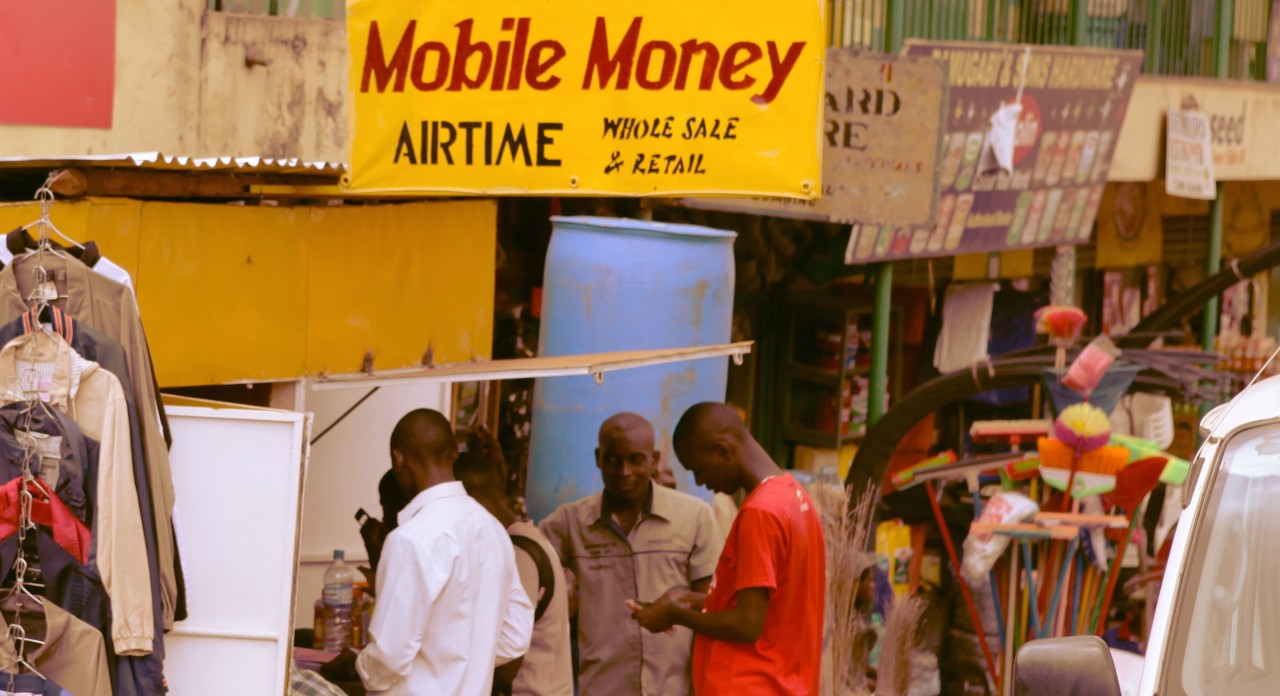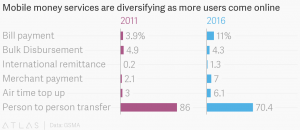Edward Joseph Karemera, 39, a resident of Buikwe district in central Uganda, has been running a fish trading business between Rwanda and Uganda for eight years, he used to make the painstaking nine-hour journey by bus to Nyabugogo in Kigali, Rwanda which is the destination of his fish, from his stores on the shores of Lake Victoria in Kiyindi at least six times in a month. His commodities go by truck, but he also had to make the trips to receive payment for the supplies, which he would change into Uganda shillings and go back to buy more fish.
The business was becoming untenable because of the long trips, and despite working with the same customers for so long nothing could change, he had to personally pick his money.
But since the introduction of a cross-border money remittance service, his clients in Kigali now send him the money on his MTN Uganda mobile money account while he is in Uganda, he saves on the costs and his business has expanded.
Mobile money adoption in Africa outpaced growth in the rest of the world, with over half of all services globally and more than 40% of adults in active use
Karemera says mobile money has been a boon for his business and can’t imagine living without mobile phones even though they only came available to him less than two decades ago. “My trade has become much easier and cost effective, its even easier dealing with workers now, anything I want I just send them money and they purchase it.”
The mobile money service has grown to include international inbound remittance transfers to other countries through partners like World Remit, Small World and Western Union.
Examples like Karemera’s support the notion that with a mobile phone, Africa has a real chance of overcoming lost years of underdevelopment.
Mobile money accounts in sub-Saharan Africa have surpassed bank accounts, says a report from global trade body GSMA. It gives a fighting chance for millions of un-banked rural poor to be financially included and benefit from products like savings and loans for their small and mostly informal businesses, money transfers, among others.
Analysts believe there is still plenty more ground to break by mobile money’s impact in Africa. Only 17% of the viable mobile money rural market has been tapped says GSMA, Tanzania for instance still has up to 92% of its people especially in rural areas still unbanked.
That said, mobile money adoption in the region outpaced growth in the rest of the world, contributing 140 mobile money services of the 277 global totals, and more than 40% of adults in the region use the service on an active basis, but it looks like this is just the beginning.
Telecom industry captains are not able to rest on their laurels, the current market dynamics are unforgiving they say. There is more pressure for telcos to generate revenue from additional services beyond voice and SMS even as the growing penetration of smartphones and internet means dwindling revenue growth caused by so called over-the top platforms disruption. More people are increasingly bypassing voice and SMS to use social medias like WhatsApp, Facebook and others, for both voice calls and instant messaging.
“Telecom operators have no choice but to capitalize on innovation and the scalable nature of mobile money” said Mats Granryd, the director general of GSMA, at the recent mobile 360 event in Dar Es Salaam.
The glossy numbers however only tell part of the story, the real equalizer effect of mobile money has been the impact of the innovation around financial services, where telecom players have churned out multiple use cases cutting across all economic divides in Africa, from simple ones like money transfer and air time top-up to more sophisticated ones like bill payments and bank-to mobile wallet transactions.
As more people overcome the digital cultural shock and become digitally literate they are shopping with tap & pay and other merchant payment solutions, while they also pay their utility bills, cable TV subscriptions and even taxes. Using mobile money significantly increases efficiencies, for instance Dar es Salaam water and sewerage cooperation registered a 38% increase in revenue collections when it started collecting it through mobile money.
Granryd also noted that telecoms have to develop more Non-communication services that ease life and solve problems, while consolidating the existing user-cases, that it is through these new revenue streams that the industry will stay afloat.
Mobile money has become a lifeline to unfortunate members of society, for instance up to 52% of refugees from Nyarugusu refugee camp in Tanzania use mobile money to receive humanitarian cash donations, remittances from home countries as well as wage payments.
Although the innovation was born in East Africa, West Africa has emerged as the new mobile money frontier, where adoption is currently almost 29% of active mobile money accounts in Sub-Saharan Africa are now based, compared to just 8% five years ago.
Markets such as Gabon, Ghana, Kenya, Namibia, Tanzania, Uganda and Zimbabwe have more than 40% of users as active mobile money users.
Sitoyo Lopokoiyit, the director of m-commerce at Vodacom Tanzania said operators will have to look beyond inter-operating with other MNO’s and innovate new services to loop it other players like banks, while deepening the existing ones.
“When I was in China I never even saw their money, all transactions were cashless, it was so efficient, that’s where we should be looking but we can’t achieve this alone as MNO’s, we have to interoperate with other industry players” said Sitoyo.
The growing stable of mobile money savings and credit products are quickly changing the way people access soft loans, M-Shwari, the M-Pesa credit product alone has disbursed soft loans amounting to $1.3 billion since 2012, most of this going to SMES’s. With a non-performing loan ratio of 1.92%, and prohibitive interest rates in banks, adoption will only grow for these credit products.
Mobile money has also been seen as a lifeline to a number of social and economic clusters in Africa, from the increasing number of agents, growing from 100,000 agents in 2011 to 1.5 million in 2016, 47% of revenues from mobile money in the region went to agents.
The wider reach of a mobile phone has proved to be an asset especially in Africa, it’s a multifaceted tool which has been improving people’s lives across the board as the world tries to connect the next billion, to accelerate this, governments have to look far by providing the needed policy support and update the archaic regulations in place.
Credit: Quartz




